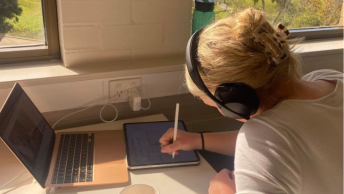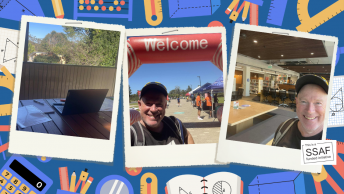This post is over three years old, the information may be outdated.
Written by Catherine Mallia
Maths phobia is real and is likely affecting your performance in subjects relying on it.
The good news is, it may have more to do with what we tell ourselves, than our actual abilities.
“This subject has a lot of maths in it so brush up your skills,” all science lecturers announce at the start of their subject.
Some students groan audibly.
Some, like me, silently sweat, wishing they understood it better in high school all those years ago.
Others may even withdraw from the subject, or resign themselves to poor grades, running from numbers forever.
So why does the very mention of maths have so many of us scrambling?
What does the research say?
Negative feelings around maths can begin as early as middle primary school age and if these negative ideas are reinforced it can become a real phobia by the time we reach adulthood.
Around the world about one third of middle to late secondary school students feel ‘tense, stressed or helpless’ when working through maths problems.

When we have difficulties with maths as kids, and if our parents and teachers or those around us have a negative view of maths, we start telling ourselves that we’re just no good at it and it’s too hard for us to understand, and the message sticks. This mental chatter and stress interferes with our working memory, which helps us store information short-term so we can think rationally, make decisions and solve problems.
Essentially, it becomes a reinforcement cycle. We fall into a habit where we doubt our abilities, then make mistakes because we’re not thinking clearly, then the mistakes reinforce the idea that we’re just bad at maths.
You might be familiar with the cycle that goes something like ‘oh no, I need maths to do chemistry, I’m going to fail, I’m not smart enough to understand it.’ Then you’re faced with a maths problem and before even reading it you’ve decided it’s too hard and you can’t do it. You procrastinate, criticise yourself, make mistakes, and give up, and your grades reflect it, starting the reinforcement cycle again.
Is there anything you can do?
Yes! There is a lot you can do. These were the most helpful for me, but the summary is, just keep at it.
Allow time, lots of it
Simply changing how you think about maths won’t make you an expert overnight. You do need to put in the time.
Allow more time than you would for other subjects, focus on the key concepts, the problems, and the strategies to solve them.
Really understand the problem and ask; What do you already know that’s been given in the problem? What do you need to find out? What’s the question really asking? How will you find the answer? Is there more than one method you could use?
This is not the subject to leave assessments until the day before they’re due if you want to do well.
Use the help that’s out there, and go back to basics
We rely more heavily on technology to calculate problems for us today, so we may have lost some of the basics. Charles Sturt’s Academic Skills Advisor in Numeracy, Noel Witney, says, “maths is a ‘use it or lose it’ skill.” If we’re not using the skills for basic problems, then we may have skipped some of the foundations to solve more complex problems. You could try practicing calculating simple things like percentage discounts at shops in your head and see if you get faster, and more confident, with tricker ones.
School maths was a distant memory for me so I started with some of the Study Link subjects in Maths through Charles Sturt. Being able to refresh basic numeracy rules moved me from ‘I just can’t do maths’ to ‘maybe I can do some maths, just don’t make it too hard.’
Sign up for the maths forums and assistance at Charles Sturt, watch videos, and don’t give up, if you’re interested and keen, you’ll get there.
Mindfulness

It’s common for people with self-doubt around maths to be so stressed when asked to solve problems that they skim read, miss vital information, and make careless mistakes. Unit conversions always trip me up, I often miss these so know to slow down and read properly. This is likely more of a response to stress, rather than poor abilities or intelligence though.
Calming your mind before attempting any maths problems might just put you in a better head space to slow down and read the problems.
Take a few breaths and focus on the present moment. Right now, your history and how you feel about maths is irrelevant, just read the problem and think about how best you could solve it.
Practice, then practice more
I made the mistake of thinking I could just read the text and understand it without spending most of my week on problems, they seemed so time consuming and stressful.
Once I decided to prioritise working through all the problems given, then find more, I started to feel like I was finally getting somewhere. In a physics subject I once filled three folders of notes and problems! That’s probably excessive, but I was determined to understand it, and the problem solving got me there, mostly.
This tactic gave me the two most important things I need, strategies and confidence. I would get many wrong, but then I could work backwards on my strategy and recognise why.
As Noel Witney, says “it’s the same as if you want to be a good swimmer, or runner. Practice, practice.” He says this even helped him with his own struggles in his maths degree. He would “do lots of problems. Look at given answers to find out how I went and self-correct.”
It’s the self-correct that stands out to me most. Simply going over the problems doesn’t teach us much. Getting them wrong, then being able to work out why, then applying that new skill to other problems, is where learning becomes fun and understanding takes place.
Don’t forget about real life
Recognising the disconnect I had formed between the text and real life was a key turning point for me.
I was helping my grade three daughter through her maths work during Melbourne’s many lockdowns when I recognised I had passed my maths phobia onto her.
She was skim reading the problem and deciding it was too hard before really thinking about it. She had closed off to understanding because of her self-doubt. When I noticed how upset she was getting, I suggested a break, then decided I would ask the questions while cooking dinner instead.
“Hey, if I need dinner ready at 6pm and it takes an hour and a half to cook, what time do you think I should start?” I asked casually, “Um, let me think, maybe 4:30?” In a few seconds, she answered one of the problems she was getting so angry at just hours before.
I applied the same concept to my own learning. Seeing worded problems on the page seemed too tricky and I’d give up, but thinking about the problems in real life throughout the day, and talking about it with people, gave me multiple strategies to solve it. Some would work, others wouldn’t, so I’d try again. It’s worth a try.

Lastly, decide what you want from maths
If you’ve read all this and thought “I don’t care enough,” then maths just may not be for you and that’s ok. I still say it’s not a strength of mine, I need to work hard at it, but I don’t panic and don’t do poorly in grades anymore. If, like me, you’re someone who always wanted to understand it but struggle, then stop telling yourself you’re bad at it, practice, and just keep at it.










